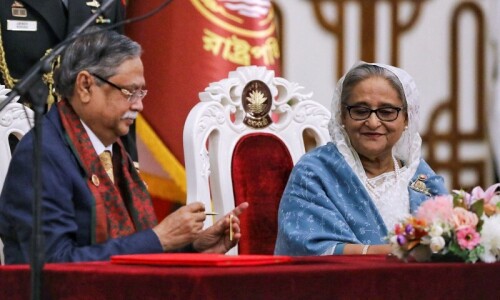Bangladesh :On Monday, leaders of the revolution that toppled autocratic ex-prime minister Sheikh Hasina in August placed increasing pressure on Bangladesh’s President Mohammed Shahabuddin to resign, arguing that he was her appointed representative.
Even though Hasina’s now-defunct Awami League elected Shahabuddin, 74, also known as “Chuppu,” in 2023, the position is largely ceremonial, and his possible removal from it has sparked concerns about a constitutional vacuum.
“Any choice with respect to the expulsion of the president will be founded on political agreement,” Shafiqul Alam, press guide to the in-between time government that supplanted Hasina, said on Monday.
Muhammad Yunus, who won the Nobel Peace Prize, serves as the interim government’s “chief adviser.”
Government representative Syeda Rizwana Hasan, a pastor in Yunus’ bureau, said there is “a continuous conversation in regards to the expulsion” of Shahabuddin.
Hasan told reporters on Sunday, “It must be considered whether a government formed after a revolution should retain a president who was selected by a fascist government.”
“The claims that he does not align with the spirit of the movement are the source of the demand for his removal.”
Shahabuddin sparked outrage earlier this month when he claimed that he had never seen a resignation letter from Hasina, raising the possibility that her departure was illegal.
Soon after, student protest leader Asif Nazrul, who is now in Yunus’s government, said the remarks were a “violation of his oath of office.”
30 officers and protesters were injured when police clashed with hundreds of people who tried to storm the presidential compound last week.
“Fragile state,” but constitutional obstacles prevent those who want to remove him from office.
A two-thirds vote in parliament is required to impeach the president, and the speaker takes over as president.
However, since Hasina’s ouster resulted in the suspension of parliament, it is unclear how a president is removed and who chooses his replacement.
Mirza Fakhrul Islam Alamgir, secretary general of the powerful Bangladesh Nationalist Party (BNP), stated, “If we want to make the most of this uprising, we should not be guided by whims that may create a constitutional vacuum.”
The protest group that is credited with starting the uprising against Hasina, Students Against Discrimination, convener Hasnat Abdullah, demanded a quick decision.
He stated, “We don’t want this situation to linger,” claiming that only the BNP opposed his removal.
However, political science professor Mamun Al Mostofa at the University of Dhaka cautioned that challenging the position could result in broader issues.
Is it possible for the public to agree on a candidate? Who knows if there will be protests the following day, even if they do? What Mostafa said
“It is unlikely that the government could handle such instability because they are in a fragile state. What would happen next? Another round of chaos.”



